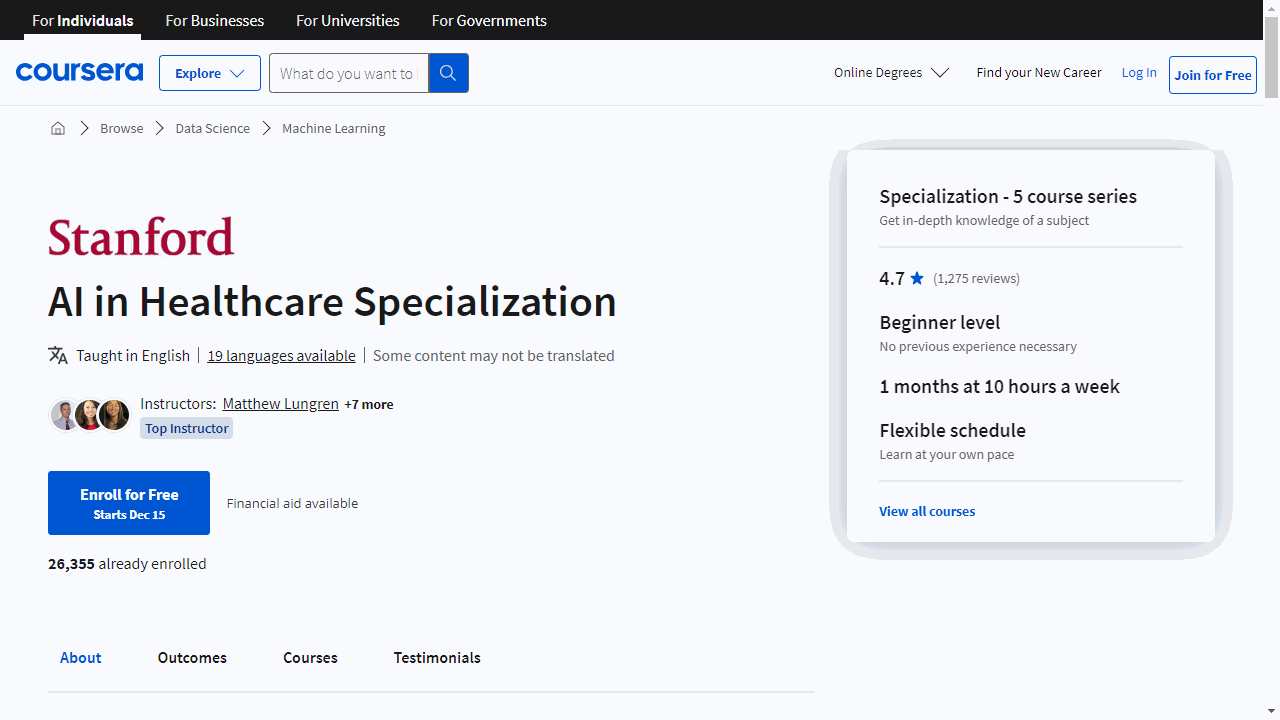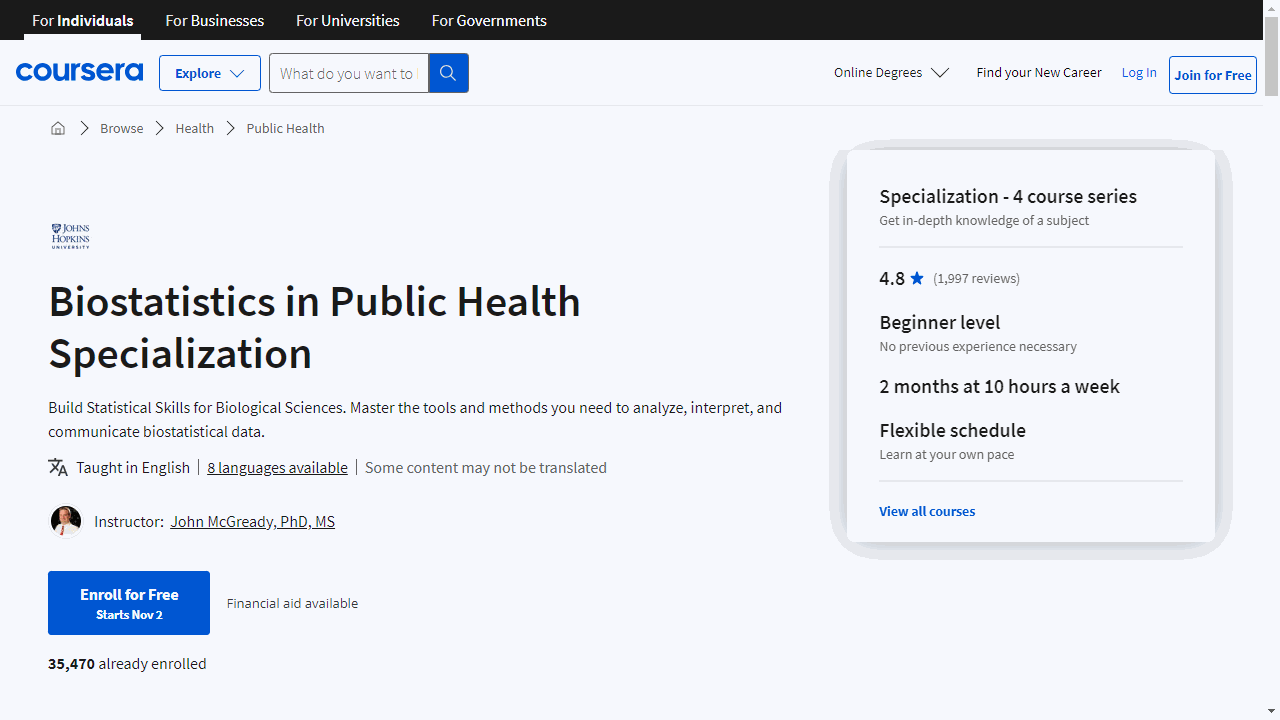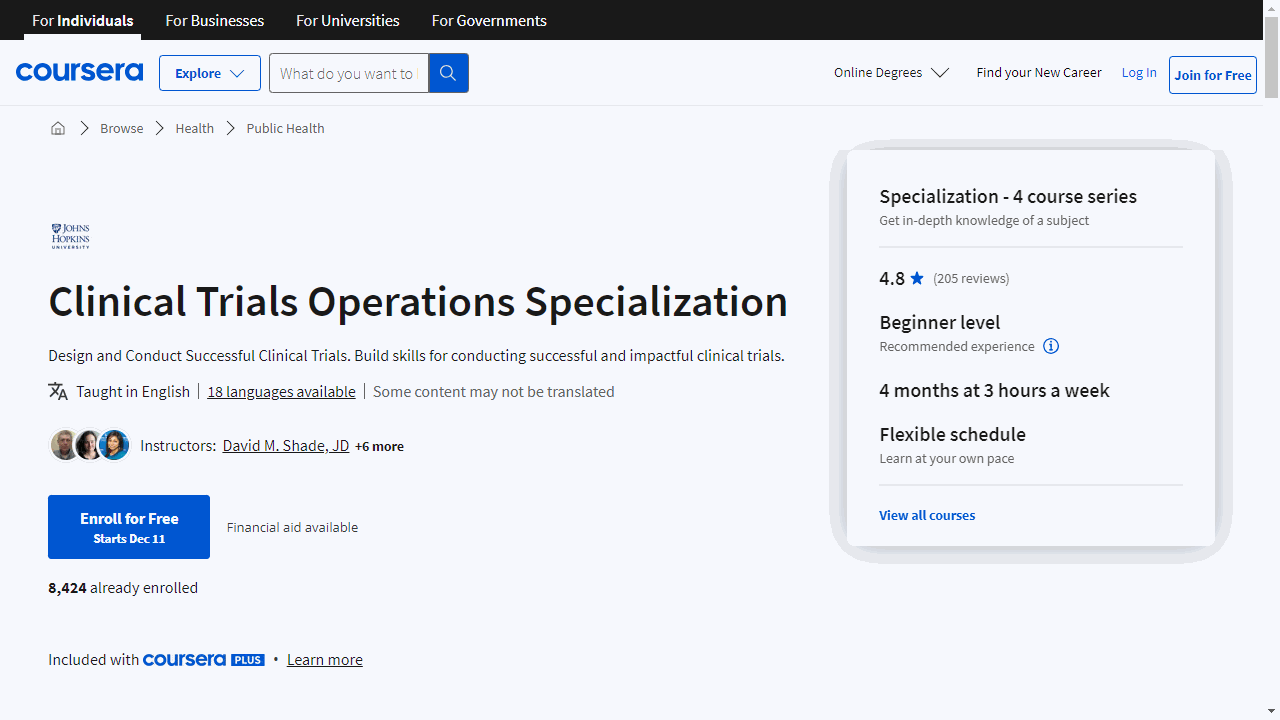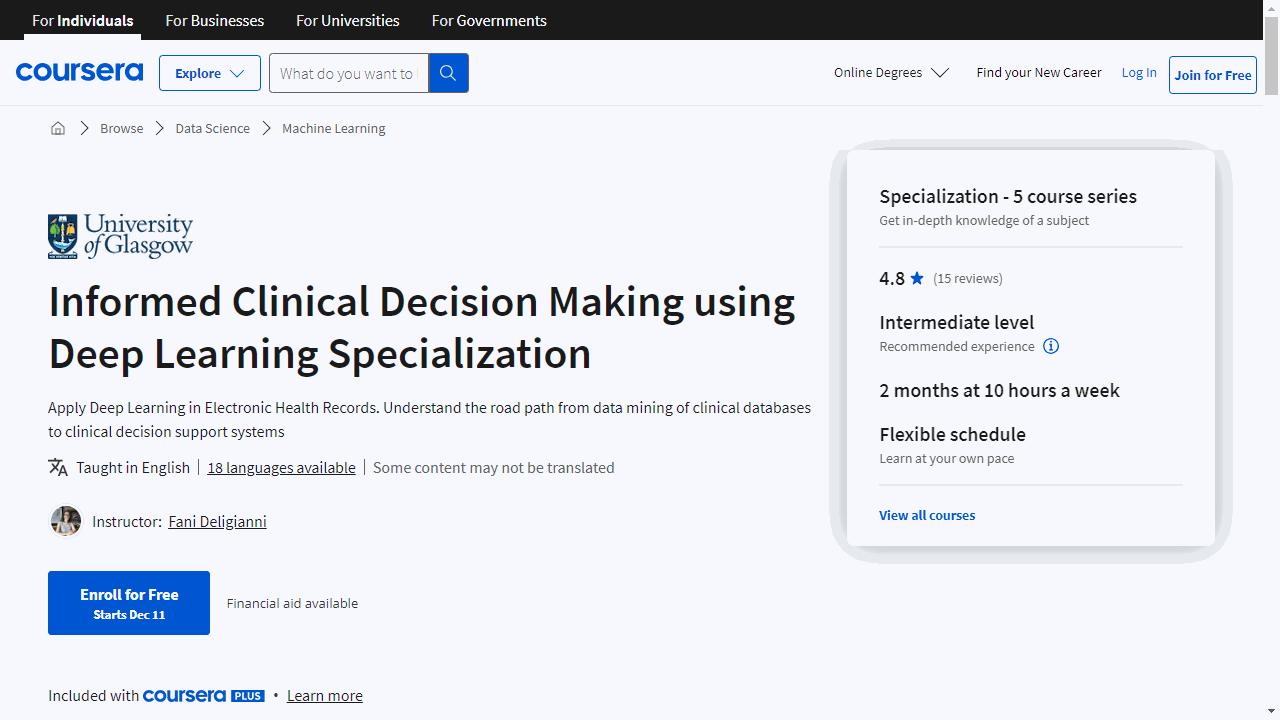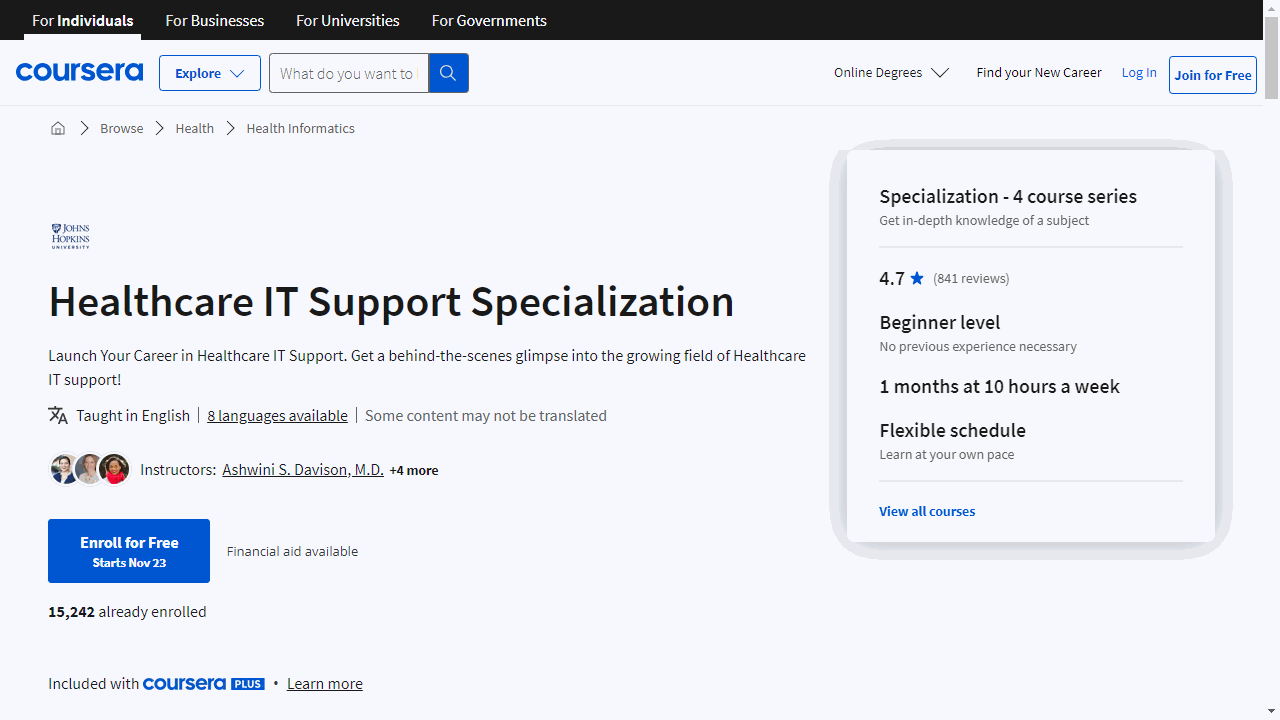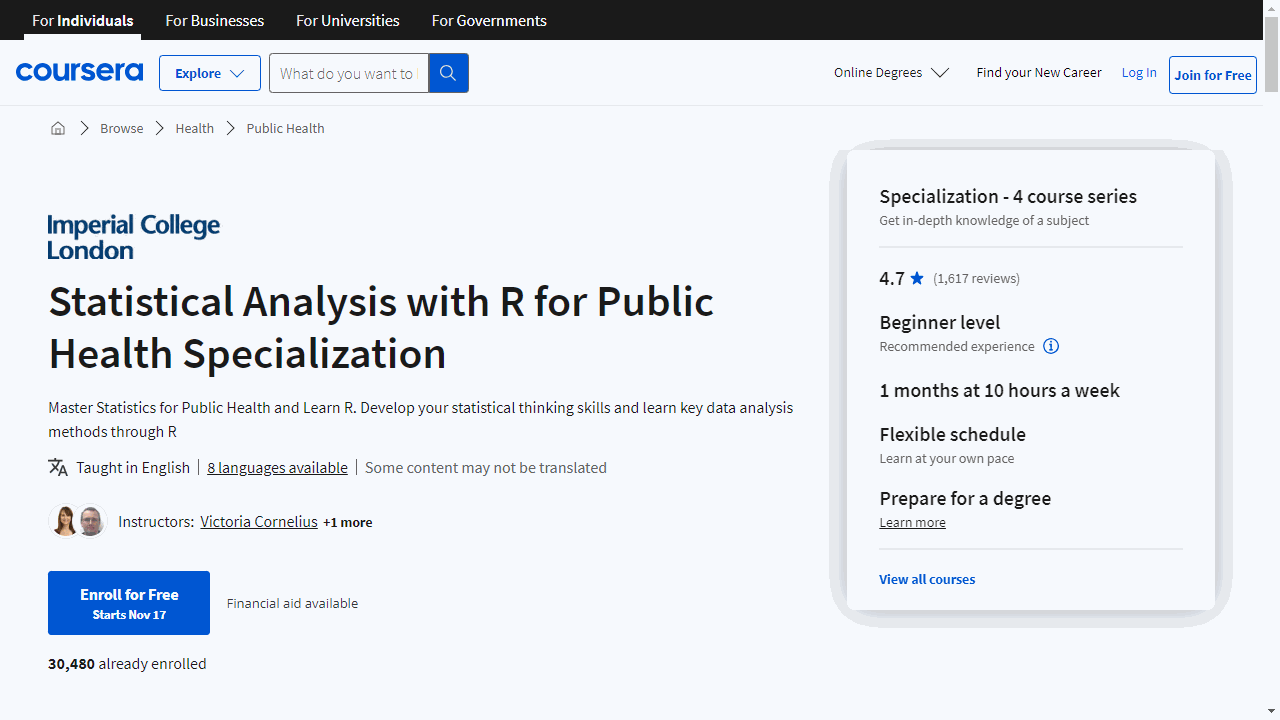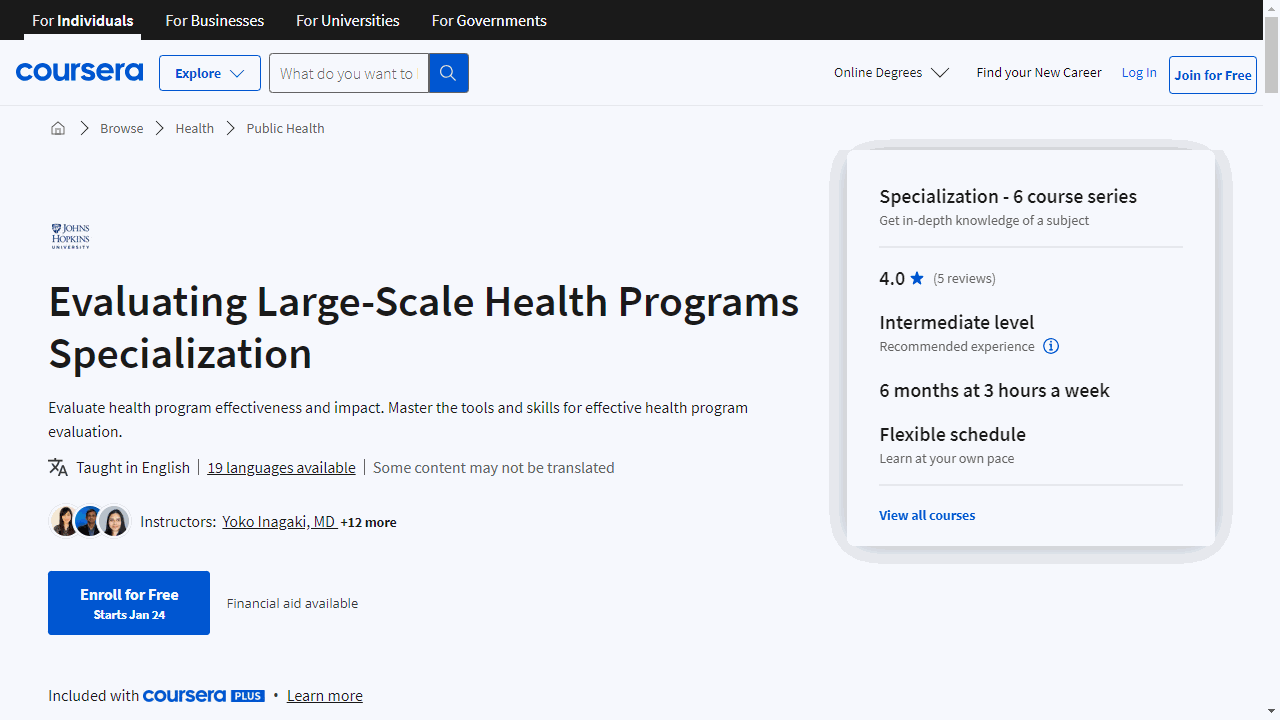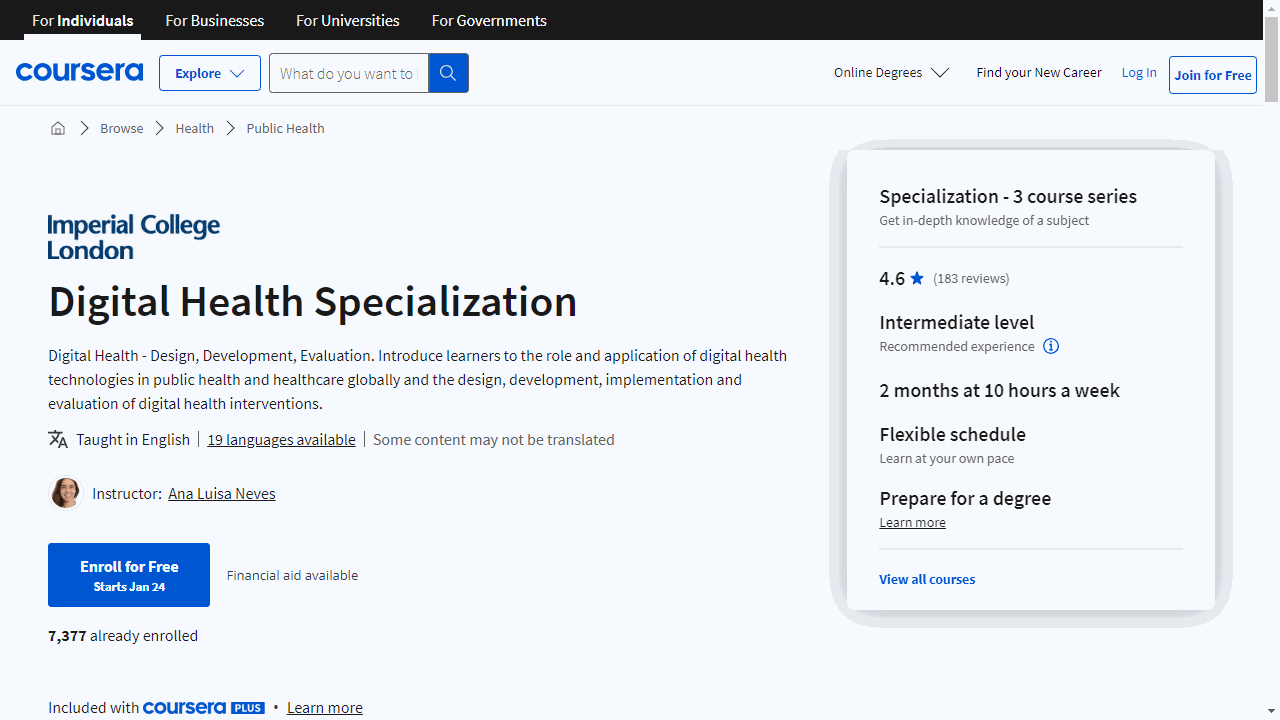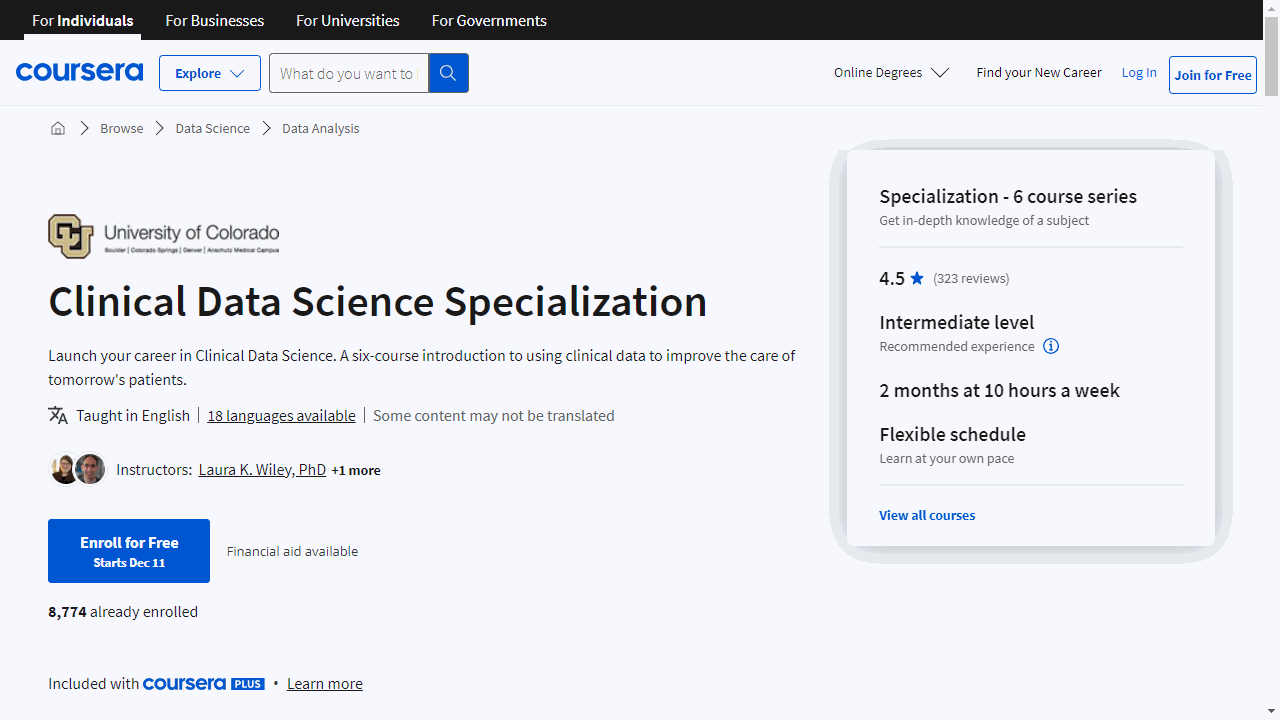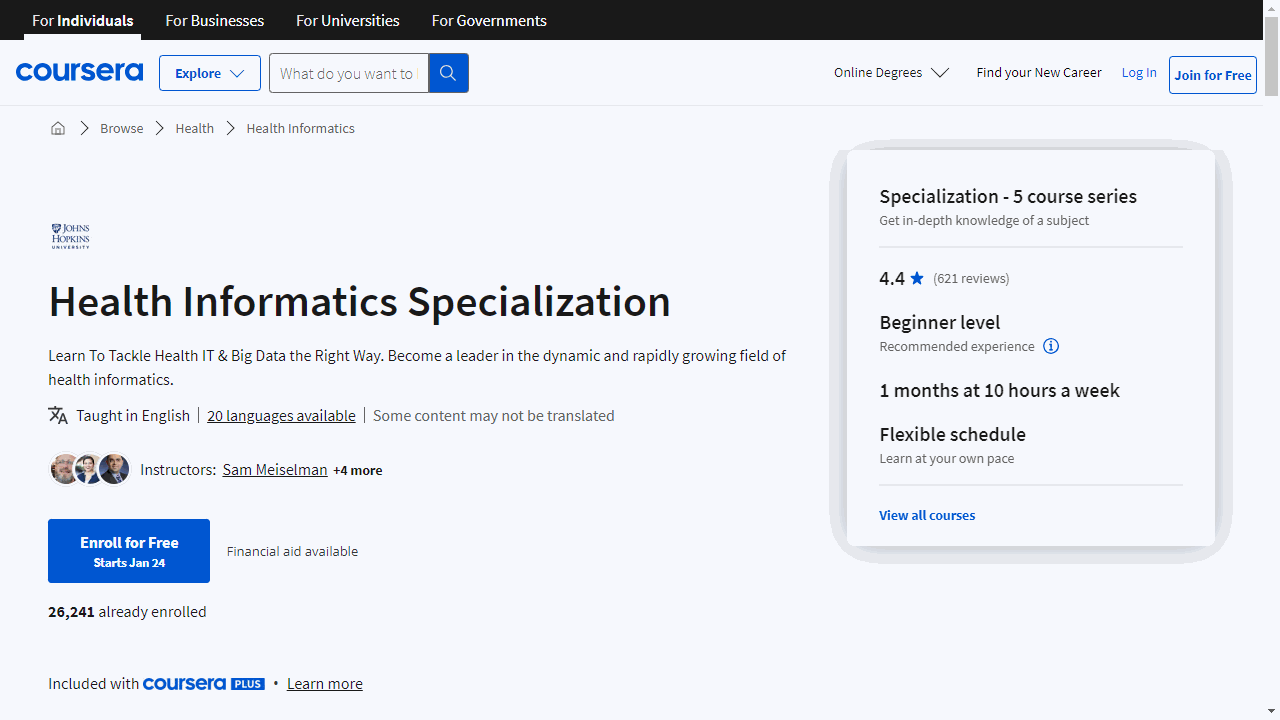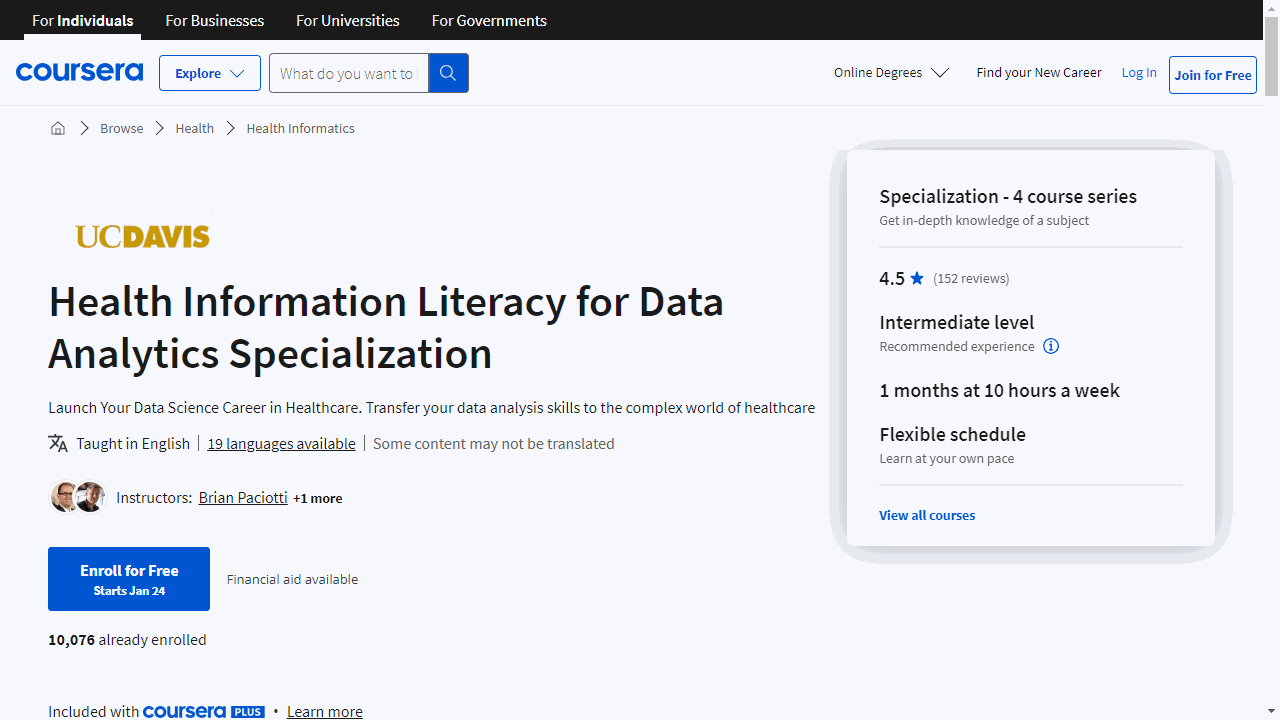The healthcare technology landscape is constantly evolving, driven by advances in data analysis, artificial intelligence, and digital health solutions.
Learning about these technologies is crucial for anyone wanting to work in this field, whether you’re a healthcare professional, a data scientist, or simply someone looking to stay informed about the future of medicine.
However, finding a good course about healthcare technology can be a daunting task, especially with so many online platforms and courses available.
We’ve reviewed and evaluated a wide range of healthcare technology courses on Coursera to identify the best options for various learning goals and skill levels.
For the best healthcare technology course overall, we recommend AI in Healthcare Specialization by Stanford University.
This specialization provides a comprehensive overview of artificial intelligence in healthcare, covering topics like data analysis, machine learning, ethical considerations, and the practical applications of AI in clinical settings.
Its emphasis on practical skills and ethical considerations prepares learners to be active participants in the transformative impact of AI on healthcare.
We’ve also included other great options for those interested in specific areas within healthcare technology, including courses on biostatistics, clinical trials operations, clinical data science, and more.
Explore our recommendations below to find the perfect course for you.
Biostatistics in Public Health Specialization
Provider: Johns Hopkins University
These statistics courses from Coursera will give you the skills you need to analyze and interpret data in public health research.
The specialization covers everything from summary measures to regression analysis.
The first course teaches you statistics basics like calculating summary measures and visualizing data.
You’ll get hands-on practice analyzing real published studies. By the end, you’ll be able to interpret data visualizations and summarize continuous and binary data.
The second course focuses on hypothesis testing and sampling methods.
You’ll learn to evaluate sample variability and calculate confidence intervals. This allows you to make statistical inferences from samples to whole populations. You’ll also master p-values for hypothesis testing.
The third course introduces simple linear regression.
You’ll determine the relationship between an outcome and a single predictor. This is key for modeling how variables impact each other. You’ll also learn to recognize confounding factors that distort statistical analysis.
The fourth course expands on regression analysis with multiple predictors.
You’ll predict an outcome based on several variables, which is crucial for public health research. The course also covers advanced regression techniques like splines and adjustments.
With these comprehensive courses, you’ll gain an in-demand skillset for public health.
The focus on practical data analysis skills prepares you to interpret and conduct statistical research.
Clinical Trials Operations Specialization
Provider: Johns Hopkins University
This set of courses equips you with the hands-on skills essential for clinical trial success, ready to contribute to impactful medical research.
Start with “Design and Conduct of Clinical Trials” to learn the nuts and bolts of trial design.
You’ll master randomization, understand how to minimize bias, and grasp the ethical considerations of participant recruitment.
These are the building blocks for producing credible trial results.
Move on to “Clinical Trials Data Management and Quality Assurance” where you’ll tackle the challenge of managing vast amounts of trial data.
Learn to collect, clean, and safeguard data, ensuring its integrity.
You’ll also become adept at implementing quality checks to maintain the highest standards.
In “Clinical Trials Management and Advanced Operations,” you’ll delve into the complexities of trial management.
From handling protocol events to promoting transparency and reproducibility, this course prepares you to maintain the safety and integrity of your research.
Finally, “Clinical Trials Analysis, Monitoring, and Presentation” teaches you to calculate sample sizes, monitor trial progress, and analyze results.
You’ll also learn to effectively communicate your findings, a critical skill for any researcher.
Throughout these courses, key entities like adaptive designs, systematic review, and meta-analysis are not just buzzwords—they’re tools you’ll use to refine your research.
You’ll leave with a deep understanding of the clinical trial process, from the importance of de-identifying data to ensuring compliance with regulations.
Informed Clinical Decision Making using Deep Learning Specialization
Provider: University of Glasgow
This specialization is a practical journey into clinical data and decision-making with cutting-edge deep learning tools.
It provides a comprehensive skill set for working with EHR data, building and interpreting machine learning algorithms, and ensuring your models are ethical and transparent.
Start with “Data mining of Clinical Databases - CDSS 1,” where you’ll master the MIMIC-III EHR database.
You’ll learn to query, extract, and visualize data, and understand ICD coding.
This course equips you with essential skills in mining clinical databases, managing EHRs, and analyzing descriptive statistics, all with a strong ethical foundation.
In “Deep learning in Electronic Health Records - CDSS 2,” you’ll explore deep learning principles and apply them to EHRs.
You’ll tackle time-series classification for ECG signals, address missing values, and learn imputation techniques.
This course prepares you to handle the complexities of EHR data and develop accurate clinical prediction models.
“Explainable deep learning models for healthcare - CDSS 3” delves into making machine learning understandable.
You’ll work with methods like PFI, LIME, and SHAP, and learn to create model-specific explanations.
By incorporating attention mechanisms in Recurrent Neural Networks, you’ll gain insights into your model’s reasoning.
“Clinical Decision Support Systems - CDSS 4” teaches you to critically evaluate machine learning systems in healthcare.
You’ll study external validation, calibration, bias, fairness, and privacy in CDSS.
The course also covers decision curve analysis and emphasizes the need for human-centered design in CDSS.
Cap off your learning with the “Capstone Assignment - CDSS 5,” applying your knowledge to a real-world challenge.
This final project solidifies your skills and demonstrates your ability to leverage deep learning in clinical decision-making.
Healthcare IT Support Specialization
Starting with “The Critical Role of IT Support Staff in Healthcare,” you’ll explore the diverse roles IT professionals play in healthcare settings.
This course offers a glimpse into the day-to-day challenges you might face, from troubleshooting at a help desk to collaborating with medical staff.
Real-life insights from Johns Hopkins IT experts provide a practical perspective on the impact of IT support in healthcare.
“Health Information Technology Fundamentals” delves into the electronic health records (EHRs) system, a cornerstone of modern healthcare.
You’ll understand the transition from paper to digital records, learn about EHR features, and grasp the importance of these systems in patient care.
The course also introduces you to the technical infrastructure, such as databases and servers, essential for maintaining these records.
With “Operations and Patient Safety for Healthcare IT Staff,” your skill set expands to include a variety of healthcare technologies.
You’ll tackle scenarios involving medical devices and learn to navigate issues with networking and connectivity.
The course emphasizes the importance of efficient support ticket management and introduces tools like JIRA, equipping you to maintain seamless operations in a healthcare environment.
Lastly, “Healthcare Data Security, Privacy, and Compliance” addresses the critical aspects of data protection in healthcare.
You’ll become familiar with healthcare data types, the significance of HIPAA, and the consequences of security breaches.
Understanding compliance with healthcare laws and regulations is crucial, and this course ensures you’re well-versed in these areas.
This specialization is not just about acquiring technical knowledge; it’s about understanding the role of IT in patient care and safety.
By the end of these courses, you’ll be prepared to step into the healthcare IT field with confidence, equipped with the skills to support technology that saves lives and protects patient data.
AI in Healthcare Specialization
Provider: Stanford University
By focusing on practical skills and ethical considerations, this specialization prepares you to be a part of AI’s transformative impact on healthcare.
Start with “Introduction to Healthcare,” where you’ll get a clear picture of the U.S. healthcare system’s inner workings.
Understanding the roles of physicians, hospitals, and insurance is crucial, and you’ll tackle the big issues like managing costs and improving care quality.
Move on to “Introduction to Clinical Data,” which equips you with the tools to ethically mine medical data.
You’ll learn to craft datasets and analyze them to answer clinical questions, all while considering the ethical implications of your work.
In “Fundamentals of Machine Learning for Healthcare,” you’ll demystify machine learning, even if you’re new to the field.
This course breaks down complex concepts like neural networks and model training into digestible parts, empowering you to evaluate and deploy AI in medicine confidently.
Then, “Evaluations of AI Applications in Healthcare” guides you through integrating AI into clinical settings.
You’ll explore how to assess AI’s impact on healthcare delivery, ensuring that the technology is used fairly and effectively.
The “AI in Healthcare Capstone” is where theory meets practice.
You’ll dive into a real-world scenario, using a unique dataset to build models that inform patient care decisions.
This hands-on project also addresses the regulatory and ethical considerations of using AI in healthcare.
Throughout these courses, you’ll gain continuing education credits, a bonus for healthcare professionals looking to stay ahead.
Statistical Analysis with R for Public Health Specialization
Provider: Imperial College London
This series of courses is designed to equip you with the statistical tools and R programming prowess needed for public health analysis.
The journey begins with “Introduction to Statistics & Data Analysis in Public Health.”
This course lays the foundation, teaching you to navigate through data sets, identify key features, and conduct basic analyses.
You’ll learn to use R, a free and widely-used software, to dissect health-related data.
The course emphasizes critical thinking and practical application, ensuring you’re not just learning concepts but also applying them to real-world scenarios.
Progressing to “Linear Regression in R for Public Health,” you’ll delve into the relationship between health factors and outcomes.
The course simplifies the process of creating statistical models, starting with correlation and moving to linear regression.
You’ll learn to prepare data, assess model fit, and test assumptions, all within the R environment.
The specialization continues with “Logistic Regression in R for Public Health,” where you’ll tackle more complex analyses.
Public health data can be challenging, but this course teaches you to manage its intricacies.
You’ll learn to run logistic regression analyses, interpret the results, and understand the implications from both individual and population health perspectives.
Lastly, “Survival Analysis in R for Public Health” introduces you to time-to-event data analysis.
You’ll explore techniques like Kaplan-Meier plots and Cox regression, applying them to patient data to identify predictors of health outcomes.
This course reinforces your understanding of regression models and hones your ability to handle real-world data.
Throughout the specialization, you’ll build a robust skill set, including the ability to describe data sets, run various regression analyses, and interpret your findings.
The courses are designed for accessibility, requiring only basic numeracy and no prior knowledge of R.
Evaluating Large-Scale Health Programs Specialization
Provider: Johns Hopkins University
This specialization equips you with the expertise to assess public health programs effectively, with a focus on those in low- and middle-income countries, though the skills are universally applicable.
Dive into “Evaluating Public Health Programs at Scale” to master the art of evaluation.
You’ll critique existing evaluations, create robust evaluation plans for maternal and child health programs, and guide stakeholders through prioritizing evaluation activities.
With “Program Design & Evaluation for Health Systems Strengthening,” you’ll understand how to fortify health systems.
This course teaches you to apply health system frameworks, design impactful programs, and evaluate their effectiveness using data analysis and other tools.
“Assessing Health Program Delivery” offers a deep dive into the implementation and quality of health services.
You’ll design assessment plans and use RADAR tools to measure program success, ensuring you can improve policies and implementation strategies.
“Household Surveys for Program Evaluation in LMICs” sharpens your survey skills.
Learn to measure program coverage, design questionnaires, and tackle survey challenges.
You’ll also understand the resources needed for successful survey implementation.
For a data-driven approach, “Measuring and Modeling Impact in Evaluations” teaches you to quantify the impact of health interventions.
Get hands-on with the Lives Saved Tool (LiST) to predict outcomes and enhance your evaluation planning.
Lastly, “Analysis and Interpretation of Large-Scale Programs” transforms you into a data wizard.
You’ll craft analysis plans, conduct quantitative research, and communicate findings to stakeholders, making data-driven decisions to improve health programs.
Supported by the Government Affairs Canada (GAC) through the RADAR project, these courses offer skills in data analysis, monitoring, evaluation, and health system strengthening.
Digital Health Specialization
Provider: Imperial College London
This program equips you with the expertise to excel in the digital health sector.
In the “Introduction to Digital Health” course, you’ll grasp essential concepts like Learning Health Systems and Electronic Health Records.
You’ll also examine cutting-edge technologies such as mobile apps, wearables, telehealth, and telemedicine.
The course delves into the impact of big data, machine learning, and artificial intelligence on healthcare, offering a case study on COVID-19 to illustrate the practical application of these technologies in managing global health crises.
Moving on to “Design and Implementation of Digital Health Interventions,” you’ll learn how to navigate the complexities of digital health projects, from understanding data regulations and ethics to overcoming technology adoption hurdles.
The course introduces the NASSS Framework, guiding you through the lifecycle of digital health solutions.
Strategic planning tools like PESTLE and SWOT analysis are also covered, sharpening your ability to strategize effectively in the digital health domain.
The final course, “Evaluation of Digital Health Interventions,” teaches you to assess the effectiveness and economic value of digital health initiatives.
You’ll become proficient in data management and visualization, and you’ll explore evaluation methods, including experimental and quasi-experimental designs, to determine the impact of digital health interventions.
Clinical Data Science Specialization
Provider: University of Colorado System
This specialization equips you with the expertise to navigate and leverage clinical data, a critical skill in healthcare.
Start with “Introduction to Clinical Data Science,” where you’ll grasp how clinical data is generated and managed, while learning SQL and R programming from scratch.
You’ll have the chance to work with actual clinical data and access Google Cloud’s tools at no extra cost.
Move on to “Clinical Data Models and Data Quality Assessments,” which dives into the structure of clinical data.
You’ll become adept at interpreting data models and using SQL to query complex databases like MIMIC3 and OMOP, enhancing your ability to work with diverse data sets.
In “Identifying Patient Populations,” you’ll master computational phenotyping to pinpoint patient groups with specific conditions, such as hypertension.
This course sharpens your ability to combine various data types and develop algorithms, using real clinical data for hands-on experience.
“Clinical Natural Language Processing” introduces you to the intricacies of NLP.
You’ll learn to extract meaningful information from clinical notes by writing regular expressions and handling text data in R, a vital skill for processing unstructured clinical narratives.
With “Predictive Modeling and Transforming Clinical Practice,” you’ll delve into the application of predictive models in healthcare, understanding the challenges of clinical implementation and the impact these models have on patient care.
Lastly, “Advanced Clinical Data Science” prepares you for complex challenges, including temporal and research quality analysis, ensuring you’re ready to tackle advanced topics in the field.
Health Informatics Specialization
Provider: Johns Hopkins University
This set of five courses gives you a comprehensive understanding of health informatics, blending technical know-how with real-world healthcare applications.
Dive into “The Social and Technical Context of Health Informatics” to grasp how health IT impacts healthcare at multiple levels.
You’ll learn to pinpoint informatics problems, analyze them with an Informatics Stack, and address the socio-technical elements critical to successful health IT solutions.
If leadership in health IT is your goal, “Leading Change in Health Informatics” prepares you to take the reins.
It’s packed with expert knowledge on leveraging big data and implementing EHRs effectively.
You’ll master change management, strategic planning, and project management, ensuring you’re ready to guide your organization through technological advancements.
“The Outcomes and Interventions of Health Informatics” is where data meets decision-making.
You’ll learn to identify where informatics can make a difference, design appropriate interventions, and monitor their effectiveness.
This course is essential for creating impactful health IT solutions that improve patient care.
For those with a passion for data, “The Data Science of Health Informatics” offers a deep dive into the complexities of health data.
You’ll learn to differentiate between various data types, formulate precise questions, and interpret data for secondary uses like research and quality improvement.
Cap it all off with the “Culminating Project in Health Informatics,” where you’ll apply everything you’ve learned to develop a comprehensive plan for a health informatics intervention.
This project is your opportunity to showcase your newfound skills and readiness to tackle health IT challenges head-on.
Health Information Literacy for Data Analytics Specialization
Provider: University of California, Davis
This set of courses equips you with the expertise to harness data in the fast-evolving healthcare sector.
Dive into “Healthcare Data Literacy” to build a solid foundation in healthcare data.
You’ll learn about the critical role of data analysts and get familiar with healthcare data types, including clinical and operational data.
Key classification systems like ICD-10 and SNOMED will no longer be a mystery to you, and you’ll master the art of turning complex data into actionable insights.
In “Healthcare Data Models,” you’ll see how data travels from patient care to life-saving insights.
This course is ideal if you’re considering a healthcare data role, teaching you about data integration and the importance of clear communication to maintain data quality.
It’s a glimpse into how data can revolutionize healthcare affordability and accessibility.
“Healthcare Data Quality and Governance” focuses on the integrity of data.
You’ll understand the significance of data quality and governance, learning to use metadata and track data provenance to ensure reliability.
This course is crucial for maintaining the high standards of data that healthcare decisions depend on.
Lastly, “Analytical Solutions to Common Healthcare Problems” puts your skills to the test.
You’ll tackle real-world problems by organizing data, categorizing medical codes, and harmonizing information from various sources.
Plus, you’ll craft a data dictionary, an essential tool for any healthcare data professional.
